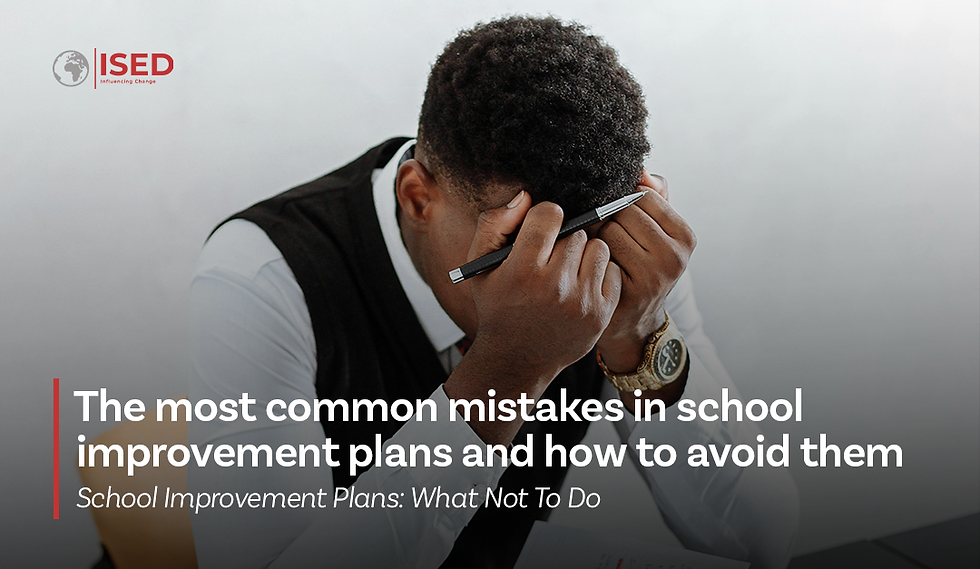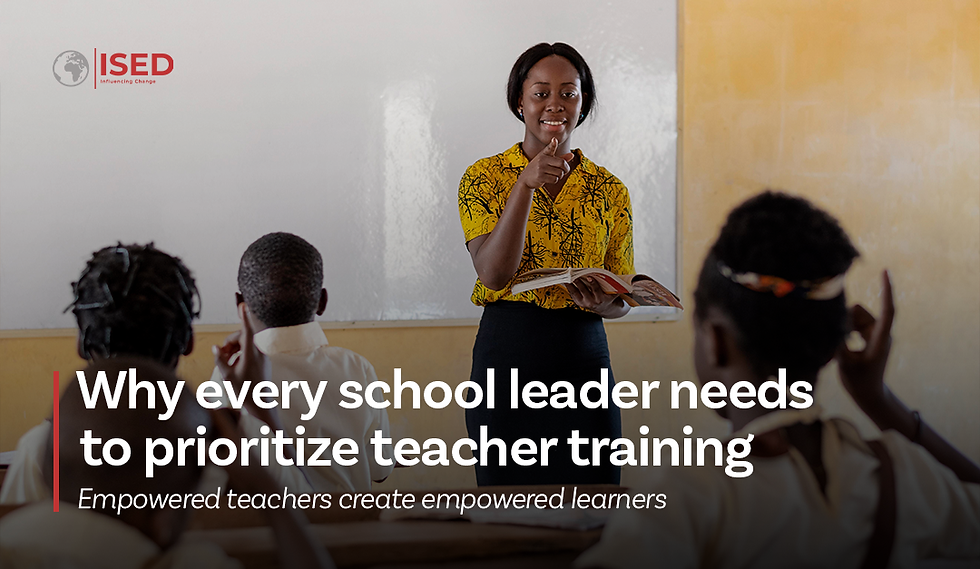Appreciating Value-added in Schools
- admin37502
- Sep 6, 2023
- 3 min read
As educators and students return to schools for the new academic year, it is important to take a minute to reflectively consider two questions:
· What went well last academic year?
· What could be done better this academic year?

Many stakeholders are involved in running effective schools. Parents, board members, administrative staff, and even the alumni provide useful feedback on standards that we set for academic excellence and behaviour expectations. The data, if deliberately collated and analysed, will improve the effectiveness of our schools as we support children and young people on their learning journeys.
‘Feedback is the food of champions!’
This quote is a reminder that we should appreciate and reflectively consider all the criticisms received over the past academic year so they can help to improve the provision in our schools. It is important that all stakeholders work collaboratively to support the students’ academic attainment and overall development, so as teachers and administrators, we should deliberately glean feedback so we can examine and determine the value we have added to our student community.
Educators typically share feedback with students, empowering them to strive to improve their personal best in academics, sports, and the arts. Determining their starting points in these areas and then planning their learning journey (as such, monitoring and evaluating our value-added ratings) will help us celebrate improvement in all areas. We will be able to respond to the questions: What Went Well (WWW) and Even Better If (EBI).
Some simple data to explore as we examine our value-added include:
· student assessment data (standardised tests and teacher assessments),
· student satisfaction data (wellness surveys, etc),
· data from the behaviour management team reports,
· staff data (attendance, satisfaction data, etc),
· parent data,
· facilities management reports,
· and any other data points that you have paid attention to in your school.
This examination is really a reflective exercise focused on determining the value we have added to our student community. If the students remain the main focus of our schools, if they remain at the core of why we have set up these schools, then it is important to continuously determine the value we are adding to them as they grow into independent adults. This reflection should happen within all working groups across our schools so that we have authentic data with which to review our strategic or improvement plans for the new academic year. The focus should not only be on high academic attainment but also on the effort put into other areas, including responsibility and independence at home. We should also examine the rewards we give for effort and attainment: are they commensurate, not outlandish? Will these rewards encourage our students to grow their sense of responsibility, hard work, diligence, resilience, and citizenship?
Success is the predictable result of hard work, patience, sacrifice, and learning put into practice every day.
As educators, we believe in the need for continuous improvement, and this should fuel our desire for relevant, current, international level benchmarking, standardisation, and accreditation. It is important in determining value-added that we benchmark ourselves against our global counterparts. Local context remains a relevant consideration throughout this reflective process, however, education is becoming increasingly digitised and as such, schools cannot ignore international standardisation. We need to continuously learn how to learn in the 21st century, and how to support our students as they learn.
We strive for excellence in our schools and pride ourselves in our students’ outstanding achievements in academics, sports, and the Arts. It’s about time we begin to pride ourselves in the value we have added to them as responsible citizens of our nations; young people who understand the need for service to their communities, who take collaborative responsibility for impact.
Schools are called learning institutions for a reason. United Nations’ SDG 4 is to ‘ensure inclusive and equitable quality education and promote lifelong learning opportunities for all’. Our schools should be safe spaces where children and young people can learn how to live within their ever-growing multicultural communities. Our mission (since we have chosen to accept it) is to empower our children and young people to succeed in all areas of life; so, it is important that we periodically pause and check on our progress as the custodians of this great mission. Measuring the value-added along the way is as important as the final impact assessments at the end of the journey.
Let us know how you measure value-added in your learning institution. Post a reply so we can share practices as we support our children and young people.







RTP LIVE RTP LIVE RTP LIVE RTP LIVE RTP LIVE RTP LIVE RTP LIVE RTP LIVE
RTP LIVE RTP LIVE
LIVE RTP LIVE RTP LIVE RTP LIVE RTP LIVE RTP LIVE RTP LIVE RTP LIVE RTP
LIVE RTP LIVE RTP
LIVE RTP LIVE RTP LIVE RTP LIVE RTP LIVE RTP LIVE RTP LIVE RTP LIVE RTP
LIVE RTP LIVE RTP
MAHJONG WINS MAHJONG WINS MAHJONG WINS MAHJONG WINS MAHJONG WINS
MAHJONG WINS MAHJONG WINS MAHJONG WINS MAHJONG WINS MAHJONG WINS
MAHJONG WAYS2 MAHJONG WAYS2 MAHJONG WAYS2 MAHJONG WAYS2 MAHJONG WAYS2
MAHJONG WAYS2 MAHJONG WAYS2 MAHJONG WAYS2 MAHJONG WAYS2 MAHJONG WAYS2
MAXWIN MAXWIN MAXWIN MAXWIN MAXWIN MAXWIN MAXWIN MAXWIN MAXWIN MAXWIN
MAHJONG WAYS MAHJONG WAYS MAHJONG WAYS MAHJONG WAYS MAHJONG WAYS
MAHJONG WAYS MAHJONG WAYS MAHJONG WAYS MAHJONG WAYS MAHJONG WAYS
SWEET BONANZA SWEET BONANZA SWEET BONANZA SWEET BONANZA SWEET BONANZA
SWEET BONANZA SWEET BONANZA SWEET BONANZA SWEET BONANZA SWEET BONANZA
RTP GACOR RTP GACOR RTP GACOR RTP GACOR RTP GACOR RTP GACOR RTP GACOR
RTP GACOR RTP GACOR RTP GACOR
POLA MAHJONG POLA MAHJONG POLA MAHJONG POLA MAHJONG POLA MAHJONG
POLA MAHJONG POLA MAHJONG POLA MAHJONG POLA MAHJONG POLA MAHJONG
POLA MAHJONG POLA MAHJONG POLA MAHJONG POLA MAHJONG POLA MAHJONG
POLA MAHJONG POLA MAHJONG POLA MAHJONG POLA MAHJONG POLA MAHJONG
RTP LIVE RTP LIVE RTP LIVE RTP LIVE RTP LIVE RTP LIVE RTP LIVE RTP LIVE
RTP LIVE RTP LIVE
KASKUS288
SLOT PASTI WD SLOT PASTI WD SLOT PASTI WD SLOT PASTI WD
SLOT PASTI WD SLOT PASTI WD
SLOT777 SLOT777 SLOT777 SLOT777 SLOT777 SLOT777
TOGEL TAIWAN TOGEL TAIWAN TOGEL TAIWAN TOGEL TAIWAN TOGEL TAIWAN
TOGEL TAIWAN
SITUS TOTO SITUS TOTO SITUS TOTO SITUS TOTO
SITUS TOTO TOGEL 4D SITUS TOTO TOGEL 4D SITUS TOTO TOGEL 4D
SITUS TOTO TOGEL 4D
TOTO TOGEL TOTO TOGEL TOTO TOGEL
TOGEL ONLINE TOGEL ONLINE TOGEL ONLINE
SLOT 4D SITUS TOTO
KARATETOTO
SLOT GACOR SLOT GACOR SLOT GACOR SLOT GACOR SLOT GACOR SLOT GACOR
SLOT GACOR SLOT GACOR SLOT GACOR SLOT GACOR SLOT GACOR SLOT GACOR
SLOT GACOR SLOT GACOR SLOT GACOR SLOT GACOR SLOT GACOR SLOT GACOR
SLOT GACOR SLOT GACOR SLOT GACOR SLOT GACOR SLOT GACOR SLOT GACOR
SLOT GACOR SLOT GACOR SLOT GACOR
SLOT 4D SLOT 4D SLOT 4D SLOT 4D SLOT 4D SLOT 4D SLOT 4D SLOT 4D
SLOT 4D SLOT 4D SLOT 4D SLOT 4D
SLOT GACOR SLOT 4D SLOT GACOR SLOT 4D SLOT GACOR SLOT 4D
SLOT GACOR SLOT 4D SLOT GACOR SLOT 4D SLOT GACOR SLOT 4D
SLOT GACOR SLOT 4D SLOT GACOR SLOT 4D SLOT GACOR SLOT 4D
SLOT GACOR SLOT 4D
TOTO SLOT TOTO SLOT TOTO SLOT TOTO SLOT TOTO SLOT TOTO SLOT
TOTO SLOT TOTO SLOT TOTO SLOT TOTO SLOT